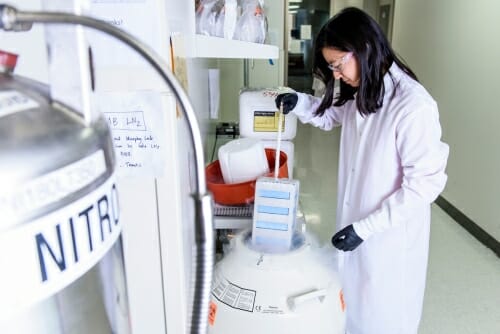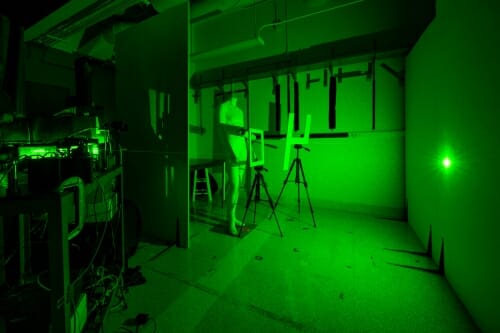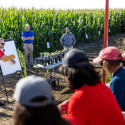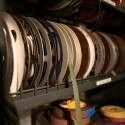Researcher Regulatory Fair to focus on connecting researchers with campus support
When the University of Wisconsin–Madison’s Tom Demke and Bethany Nelson answer their phones or open their email, it’s very possible they will find a seemingly outrageous research proposal or perplexing question.
Like the time they were asked how to import reindeer meat from Scandinavia for analysis at UW–Madison. Or the time they received questions about shipping a vaccine for use in a herd of cattle in Morocco. And they haven’t forgotten the request for a sample of radiation-resistant bacteria, the shipment of dead spiders overseas, or the question about getting an endangered crocodile skin into the country.
Demke and Nelson say they like this part of their jobs.
As the staff of the UW–Madison Export Control program in the Office of the Vice Chancellor for Research and Graduate Education, Demke and Nelson help researchers navigate U.S. export control laws and regulations. On Oct. 29, they will also help host the Research Regulatory Fair, intended to connect researchers with offices on campus that, like theirs, provide research support in areas such as contracts, institutional review boards, conflict of interest, intellectual property, safety, drones and more.
The fair runs from 11 a.m. until 1:30 p.m. at Union South, Varsity Hall, 1308 W. Dayton St. in Madison, and is open to anyone involved in research, including faculty, postdocs, graduate students and administrators.

The UW–Madison Export Control program helps researchers navigate laws and regulations, maintain compliance, and ensure work with controlled equipment — such as lasers, centrifuges and select agents — continues uninterrupted. Photo: Bryce Richter
Demke and Nelson work closely with Legal Affairs, Research and Sponsored Programs, Federal Relations and the Office of Environment, Health and Safety. They hope the fair provides ample networking opportunities and informs people where to go on campus for answers to complex questions about compliance.
“We always hear concerns about administrative burden and we try to not add to that, but instead to be a resource to help make compliance easier,” Nelson says. “We have a culture on campus of asking: ‘How do we all work together to make this happen?’ With the fair, we hope to bring the right people together to answer that for just about any scenario.”
Nelson joined the Export Control program six years ago. She has a law degree from UW–Madison and a bachelor’s in physics from UW–Milwaukee.
Demke, a former dentist — “It turns out that I didn’t like teeth and gums,” he says — first arrived at UW–Madison in 2002 to work with the IceCube project. He’s passionate about basic science and fields such as pathology and astronomy. This passion led him to export control, and he cites over 30 years of experience in compliance.
Together, the roles of Nelson and Demke are critical to ensuring that researchers comply with federal regulations. They help answer questions about how to ship mice or cells, and about contract reviews. They help address travel concerns and ensure work with controlled equipment on campus — such as lasers, centrifuges and select agents — continues uninterrupted.
The export control offices are located in the Space Science and Engineering Center, where Demke also holds a half-time position. The term “export” covers a broad group of actions that include not only shipping items overseas, but also sending information or data to foreign persons and encrypting information on laptops, particularly during travel abroad.
“When most people think of export control, they think of the classic ‘I stick something in a box and ship it out of the country and do I need to worry about that?’” Demke says. “That’s where we start, but there are many other things that get pulled into the export control area.”
It also means helping researchers comply with the oft-varying requirements of multiple federal agencies.

“We always hear concerns about administrative burden and we try to not add to that, but instead to be a resource to help make compliance easier,” Nelson says. Photo: Bryce Richter
“Just because you comply with one set of regulations doesn’t mean you are in compliance with all of the necessary government regulations,” adds Demke, whose shelves are lined with the kinds of ordinary items — pencils and toothbrushes — subject to regulatory action, and that tell the story of a field that is always in flux. “You might need a license from one agency and a permit from another.”
Nelson and Demke also assist anyone on campus doing work with persons, businesses or organizations from or located overseas, especially in Iran, Syria, Sudan, North Korea, Cuba or the Crimea.
It is important, for example, for researchers to contact the Export Control Office for guidance whenever they find themselves working with deemed exports — any time a foreign person gains access to controlled information, data or technology in the United States, from hiring staff members from overseas to speaking with foreign collaborators at conferences in the U.S..
“We also have a lot of controlled technology on our campus, but people don’t necessarily know what is controlled and how to comply to ensure they can still work without interruptions,” Nelson says. “I guess you could say our goal is to come up with ways to make research work here, with as few interruptions as possible, while still making sure we are in compliance.”
She adds: “We do a lot of brainstorming. We have our own little corner of the world in export control, but with the work that we do, we seem to touch a lot of other places.”
The Research Regulatory Fair will offer free refreshments and Bucky Badger is scheduled to appear. The first 100 attendees will receive a stress cow.
Advance registration is not required but for more information, contact Nelson at bcnelson2@wisc.edu.




